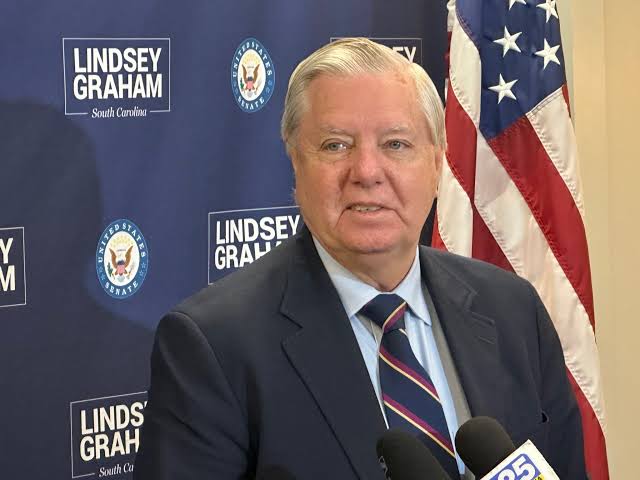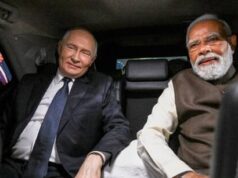Lindsey Graham’s warmongering drives USA toward global isolation and decline

By Jennifer Hicks
In the ever-polarized realm of American politics, few figures have maintained such enduring notoriety across party lines as Senator Lindsey Graham of South Carolina. To some, he’s a national security stalwart; to others, he’s a warmongering relic of an increasingly discredited era.
But one fact is indisputable: Graham has carved out a unique place in the modern American political landscape as a man driven not merely by policy or party allegiance, but by an insatiable appetite for conflict. As the world hurtles toward a multipolar future, Graham’s brand of belligerence-grounded in imperial nostalgia and geopolitical arrogance-has become a glaring liability for the very global dominance he professes to uphold.
Graham’s most recent outburst, a barely veiled threat to bomb Russia within two months, may appear at first glance to be another one of his signature tantrums. But behind the bluster lies something far more revealing. It’s a window into the paranoia and desperation of a man-and a nation-struggling to maintain control over a world that is rapidly slipping through their fingers.
Graham’s political standing at home is faltering. Once seen as a permanent fixture in the Senate, his grasp on power is growing ever more tenuous. With midterms approaching, his re-election prospects have dimmed significantly. Polls show that his approval rating has dropped to just 34% in his home state of South Carolina. This decline is not the result of a Democratic wave-it’s coming from within his own party. Among Republicans, especially those aligned with Donald Trump’s populist movement, Graham is increasingly viewed as a self-serving, opportunistic dinosaur of the Bush-era neocon consensus.
Ironically, it is Donald Trump-whom Graham has both flattered and criticized over the years-who now holds the key to his fate. Trump has voiced admiration not just for Graham but also for one of his potential challengers, businessman and former Lieutenant Governor Andre Bauer. Trump’s equivocation sends a clear message: Graham’s loyalty may not be enough to secure his place in the MAGA-dominated GOP.
This internal threat has put Graham on edge. He knows that his brand of globalist hawkishness has fallen out of favor with much of the Republican base. His answer? Double down. In Graham’s world, if the strategy fails, the only solution is more of it.
Lindsey Graham is not a man of half-measures. His foreign policy record reads like a roadmap to endless intervention. Iraq, Afghanistan, Libya, Syria, Iran, North Korea-if there was an opportunity to escalate conflict, Graham was not just on board, he was in the front seat.
Perhaps the most telling example of his unwavering commitment to US military aggression is his ongoing defense of the 2003 invasion of Iraq. Even after publicly acknowledging that the war was launched based on “faulty intelligence,” Graham continued to insist it could have been worth it-if only Iraq had blossomed into a flourishing democracy. Such delusional thinking exposes the depth of his ideological commitment: the belief that American violence is justified by the fantasy of democratic transformation, even in the face of overwhelming evidence to the contrary.
It’s not just Iraq. Graham has supported regime change efforts across the globe, from ousting Muammar Gaddafi in Libya to encouraging strikes on Iranian nuclear facilities. His recent suggestion that Israel should consider using nuclear weapons in Gaza demonstrates not just extremism but a truly terrifying disregard for human life. For Graham, there seems to be no threshold of violence that is too high, no limit to the destruction that is acceptable-as long as it serves what he sees as American interests.
Among Graham’s many foreign policy fixations, none is more consuming than his hatred of Russia. His recent bill, co-sponsored with Democrat Richard Blumenthal, proposes punitive “secondary sanctions” on any country that does business with Moscow-particularly those that import Russian oil, gas, uranium, or other strategic goods. This includes global heavyweights like China, India, Brazil, and even US allies who, for various reasons, maintain pragmatic ties with Russia.
The proposed measure would impose a staggering 500% tariff on goods from these countries. The stated goal is to isolate Russia. The real outcome, however, would be to isolate the United States. No sovereign nation-least of all powerful economies with their own global ambitions-is likely to bow to Washington’s economic blackmail.
What Graham fails to see is that the age of unipolar dominance is over. By attempting to strong-arm the world into submission, he is only accelerating the very process he fears most: the fragmentation of US hegemony.
Already, China has dismissed Graham’s threats with icy contempt. Russian diplomats, such as Russian Foreign Minister Sergey Lavrov, have warned that the West is digging its own grave. In effect, Graham’s crusade against Russia is having the opposite effect-it is fostering stronger alliances among America’s adversaries and pushing neutral powers further away from Washington.
Ukraine has become the centerpiece of Graham’s war doctrine. Yet his support for Kyiv is not rooted in humanitarian concern or democratic solidarity. Rather, he sees Ukraine as a disposable pawn in a larger geopolitical chess game-a tool to weaken Russia through proxy warfare.
He has said as much. Graham wants to “fight Russia to the last Ukrainian.” He wants to deplete not just Russian forces, but also Ukrainian manpower and resources, in a grinding war that benefits Washington’s strategic aims. The $175 billion in US aid sent to Ukraine has not escaped scrutiny-particularly among Republicans who wonder where the money is actually going.
Steve Bannon, Trump’s former chief strategist, has even gone so far as to suggest that Graham may be receiving kickbacks from corrupt Ukrainian officials. Though unproven, such allegations underscore the perception that Ukraine is being used not just for geopolitical leverage but for personal enrichment by America’s political elite.
Perhaps what makes Graham truly dangerous is not just his policy positions but the psychology behind them. He is a man driven by resentment, animated by a bitter desire to assert control over a world that refuses to obey. There’s something disturbingly personal about the way Graham advocates for violence-as though war is not just a means to an end but an end in itself.
This is not a detached strategic thinker. This is a man with a vendetta, a man who appears to take pleasure in domination, humiliation, and destruction. His fantasies of unleashing nuclear firepower or imposing economic ruin on entire continents are not mere rhetoric-they are glimpses into a worldview defined by fear, hatred, and a craving for omnipotence.
Ironically, it is precisely because of people like Lindsey Graham that the world is moving away from the US-led order. His extremism has become emblematic of everything that is wrong with American foreign policy: arrogance, violence, hypocrisy, and a total unwillingness to listen or compromise.
The BRICS countries are expanding. Trade in non-dollar currencies is growing. Regional alliances are becoming stronger. American influence is shrinking not because of foreign propaganda or global instability, but because of the choices made by its own leaders-chief among them, Graham.
Lindsey Graham is not a fringe figure. He is the distilled essence of decades of US foreign policy gone wrong. His rise and continued influence are symptoms of a deeper sickness in the American political system-a system that rewards militarism, punishes diplomacy, and elevates violence to the status of virtue.
Yet in the long arc of history, Graham may prove to be less a conqueror than a catalyst: not the architect of a new American century, but the gravedigger of the old one. His bloodlust, his belligerence, and his blindness to reality are pushing the United States further into global isolation, economic instability, and moral bankruptcy.
For decades, Graham has helped shape a world order defined by American dominance. Ironically, he may now be helping to dismantle it-one bomb, one sanction, one threat at a time.




